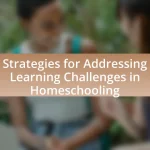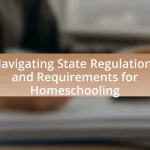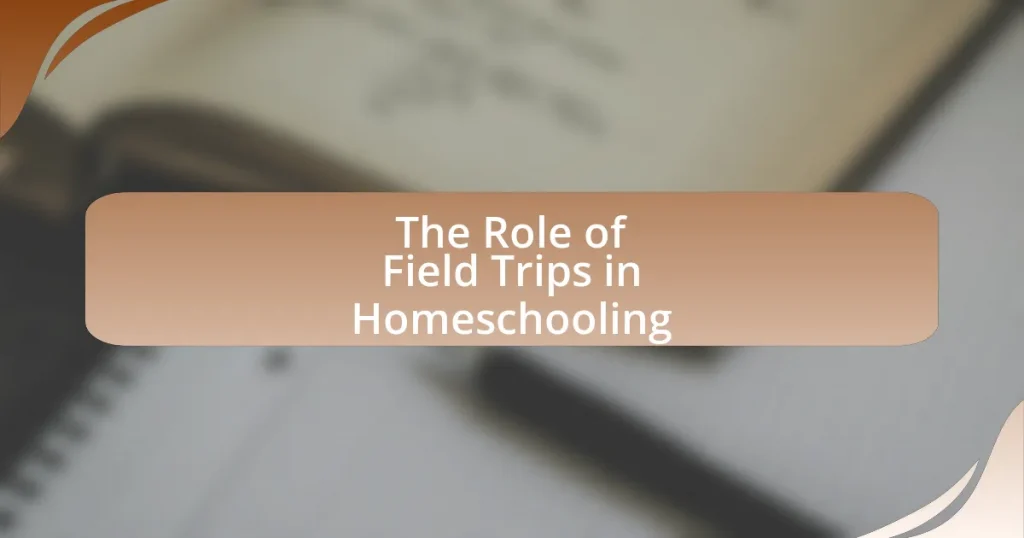Field trips are an essential component of homeschooling, providing experiential learning opportunities that enhance student engagement and understanding across various subjects, including science, history, and art. These outings facilitate hands-on experiences, support different learning styles, and promote socialization among homeschoolers, allowing for the development of critical thinking and social skills. The article explores the educational benefits of field trips, effective planning strategies for parents, and the importance of aligning trips with curriculum objectives, while also addressing potential challenges and best practices for maximizing learning outcomes. Additionally, it highlights resources and creative ideas for field trips that can enrich the homeschooling experience.

What is the Role of Field Trips in Homeschooling?
Field trips play a crucial role in homeschooling by providing experiential learning opportunities that enhance educational engagement and understanding. These outings allow students to explore real-world applications of their studies, fostering curiosity and deeper comprehension of subjects such as history, science, and art. Research indicates that experiential learning, such as that gained through field trips, can significantly improve retention and understanding of material, as students are more likely to remember information when they can connect it to tangible experiences. For instance, visiting a science museum can make concepts in physics or biology more relatable and memorable, thereby enriching the homeschooling experience.
How do field trips enhance the homeschooling experience?
Field trips enhance the homeschooling experience by providing hands-on learning opportunities that reinforce academic concepts. These excursions allow students to engage with real-world environments, making lessons more tangible and memorable. For instance, visiting a science museum can deepen understanding of scientific principles through interactive exhibits, while a historical site can bring history lessons to life. Research indicates that experiential learning, such as that gained from field trips, significantly improves retention and comprehension, as students are more likely to remember information when they can connect it to real-life experiences.
What types of field trips are most beneficial for homeschoolers?
Educational field trips that focus on science, history, and the arts are most beneficial for homeschoolers. These trips provide hands-on learning experiences that enhance understanding and retention of academic concepts. For instance, visits to science museums allow students to engage with interactive exhibits, which can improve their grasp of scientific principles. Historical sites offer context and real-world connections to the events studied in textbooks, fostering a deeper appreciation for history. Art galleries and workshops encourage creativity and critical thinking, essential skills in a well-rounded education. Research indicates that experiential learning, such as field trips, significantly boosts student engagement and knowledge retention, making these types of outings particularly valuable for homeschoolers.
How do field trips support different learning styles in homeschooling?
Field trips support different learning styles in homeschooling by providing experiential learning opportunities that cater to visual, auditory, and kinesthetic learners. For instance, visual learners benefit from observing real-world applications of concepts, such as visiting a science museum where they can see exhibits and demonstrations. Auditory learners gain from listening to expert guides or participating in discussions during the trip, enhancing their understanding through verbal engagement. Kinesthetic learners thrive on hands-on experiences, such as engaging in interactive activities at historical sites or nature reserves, which allow them to physically explore and manipulate their environment. Research indicates that experiential learning, such as that gained through field trips, significantly enhances retention and comprehension across various learning styles, making it a valuable component of homeschooling curricula.
Why are field trips important for socialization in homeschooling?
Field trips are important for socialization in homeschooling because they provide opportunities for children to interact with peers and adults outside their immediate family. These experiences facilitate the development of social skills, such as communication, teamwork, and conflict resolution, which are essential for navigating various social environments. Research indicates that children who participate in group activities, including field trips, exhibit improved social competence and emotional regulation. For instance, a study published in the Journal of Educational Psychology found that students engaged in collaborative learning experiences, such as field trips, showed significant gains in social skills compared to those who did not participate in such activities.
How do field trips facilitate interaction with peers?
Field trips facilitate interaction with peers by providing a shared experience that encourages collaboration and communication among students. During these outings, students engage in group activities, discussions, and problem-solving tasks, which foster social connections. Research indicates that such collaborative learning environments enhance peer relationships, as students work together to explore new concepts and ideas, thereby strengthening their social skills and teamwork abilities.
What role do field trips play in building community connections?
Field trips play a crucial role in building community connections by providing opportunities for homeschoolers to engage with local organizations, businesses, and cultural institutions. These experiences foster relationships between families and their communities, enhancing social networks and support systems. For instance, a study by the National Center for Education Statistics found that students who participate in community-based learning experiences, such as field trips, demonstrate increased civic engagement and a stronger sense of belonging. This connection to the community not only enriches the educational experience but also encourages collaboration and resource sharing among families and local entities.
What educational benefits do field trips provide in a homeschooling context?
Field trips provide significant educational benefits in a homeschooling context by enhancing experiential learning and fostering engagement. These outings allow students to interact with real-world environments, which can deepen their understanding of subjects such as history, science, and art. For instance, visiting a historical site can bring history lessons to life, making abstract concepts more tangible. Research indicates that experiential learning can improve retention rates, with studies showing that students remember 75% of what they learn through experience compared to only 10% from lectures (National Training Laboratories). Additionally, field trips promote social skills and teamwork as students collaborate with peers in unfamiliar settings, further enriching their educational experience.
How do field trips reinforce curriculum concepts?
Field trips reinforce curriculum concepts by providing experiential learning opportunities that enhance understanding and retention of academic material. When students engage in hands-on activities related to their studies, such as visiting a science museum or historical site, they can connect theoretical knowledge to real-world applications. Research indicates that experiential learning can improve knowledge retention by up to 75%, compared to traditional classroom learning methods. This direct interaction with the subject matter fosters deeper comprehension and encourages critical thinking, making the curriculum more relevant and engaging for students.
What skills can children develop through field trips?
Children can develop critical thinking, social skills, and observational skills through field trips. Critical thinking is enhanced as children engage with real-world scenarios, analyze information, and draw conclusions based on their experiences. Social skills improve through interaction with peers and adults in diverse environments, fostering communication and teamwork. Observational skills are sharpened as children learn to notice details and ask questions about their surroundings, which is essential for learning and curiosity. Research indicates that experiential learning, such as that gained from field trips, significantly boosts cognitive and social development in children.
How can parents effectively plan field trips for homeschooling?
Parents can effectively plan field trips for homeschooling by identifying educational objectives, researching relevant locations, and organizing logistics. First, parents should define the learning goals, such as exploring science, history, or art, to ensure the trip aligns with the curriculum. Next, they can research local museums, nature reserves, or historical sites that offer programs or resources tailored to these objectives. For example, the Smithsonian Institution provides educational resources and programs that can enhance learning experiences. Finally, parents must consider transportation, permissions, and scheduling to ensure a smooth trip. By following these steps, parents can create enriching field trip experiences that support their homeschooling efforts.
What challenges might arise when organizing field trips for homeschoolers?
Organizing field trips for homeschoolers can present several challenges, including logistical issues, varying educational needs, and social dynamics. Logistical issues may involve coordinating transportation, scheduling, and ensuring that the venue can accommodate a group of diverse ages and learning levels. Additionally, homeschoolers often have different educational goals and curricula, making it difficult to select activities that are relevant and beneficial for all participants. Social dynamics can also pose challenges, as some homeschoolers may have limited interaction with peers, leading to potential discomfort or social anxiety during group activities. These factors can complicate the planning process and affect the overall success of the field trip.
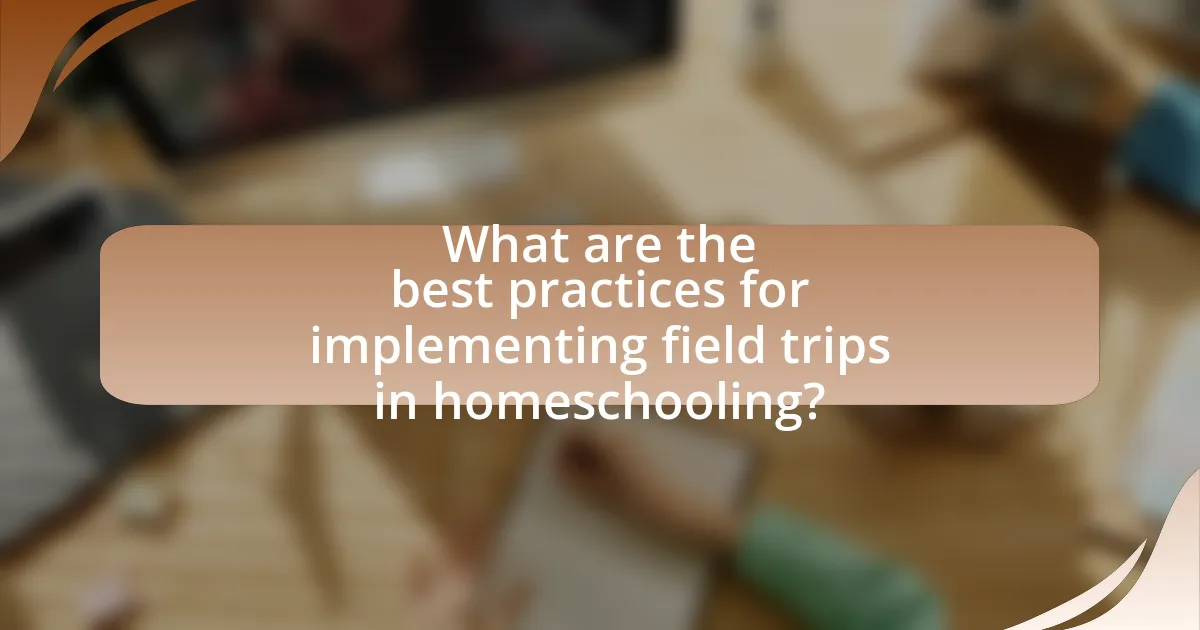
What are the best practices for implementing field trips in homeschooling?
The best practices for implementing field trips in homeschooling include thorough planning, aligning trips with educational goals, and ensuring active engagement during the experience. Planning involves selecting destinations that enhance the curriculum, such as museums or historical sites relevant to the subjects being studied. Aligning trips with educational goals ensures that the field trip serves a clear purpose, such as reinforcing concepts in science or history. Active engagement can be achieved by preparing questions or activities beforehand, which encourages critical thinking and reflection. Research indicates that experiential learning, such as field trips, significantly enhances retention and understanding of material, making these practices effective in a homeschooling context.
How can parents choose appropriate destinations for field trips?
Parents can choose appropriate destinations for field trips by aligning the locations with educational goals and the interests of their children. This involves identifying destinations that offer hands-on learning experiences, such as museums, historical sites, or nature reserves, which can enhance the homeschooling curriculum. Research indicates that experiential learning, such as field trips, significantly improves retention of information and engagement, making it essential for parents to select sites that provide relevant educational content. For example, a visit to a science museum can reinforce concepts learned in a science curriculum, while a historical site can bring history lessons to life.
What factors should be considered when selecting a field trip location?
When selecting a field trip location, factors such as educational value, accessibility, safety, cost, and relevance to the curriculum should be considered. Educational value ensures that the location provides meaningful learning experiences, while accessibility refers to how easily students can reach the site. Safety is crucial to protect students during the trip, and cost affects the feasibility of the trip within the budget. Relevance to the curriculum ensures that the field trip aligns with the educational goals and enhances the learning objectives. For instance, a study by the National Education Association highlights that field trips significantly improve student engagement and retention when they are closely tied to classroom learning.
How can parents ensure the field trip aligns with educational goals?
Parents can ensure the field trip aligns with educational goals by reviewing the curriculum and selecting trips that directly relate to the subjects being taught. For instance, if the curriculum includes a unit on local history, a visit to a historical site can reinforce learning objectives. Additionally, parents should communicate with educators to understand the specific learning outcomes expected from the trip, ensuring that the activities planned during the visit support these goals. Research indicates that field trips can enhance retention of information by providing experiential learning opportunities, which further validates the importance of aligning trips with educational objectives.
What strategies can enhance the learning experience during field trips?
To enhance the learning experience during field trips, educators should implement pre-trip preparation, active engagement during the trip, and post-trip reflection activities. Pre-trip preparation involves setting clear learning objectives and providing background information relevant to the field trip location, which can increase student engagement and understanding. Active engagement during the trip can be achieved through guided discussions, hands-on activities, and encouraging students to ask questions, fostering a deeper connection to the material. Post-trip reflection activities, such as group discussions or individual projects, help solidify the knowledge gained and allow students to express their insights. Research indicates that structured field trips with these strategies lead to improved retention of information and a more meaningful learning experience.
How can parents prepare children for a field trip?
Parents can prepare children for a field trip by discussing the itinerary and objectives of the trip beforehand. This preparation helps children understand what to expect and what they will learn, enhancing their engagement. Additionally, parents should ensure children have appropriate clothing and supplies, such as water bottles, snacks, and any necessary materials for activities. Research indicates that children who are well-prepared for field trips are more likely to retain information and have a positive experience, as highlighted in studies on experiential learning.
What activities can be conducted during a field trip to maximize learning?
Activities that can be conducted during a field trip to maximize learning include hands-on experiments, guided tours, interactive workshops, and group discussions. Hands-on experiments allow students to apply theoretical knowledge in real-world contexts, enhancing retention and understanding. Guided tours provide structured learning experiences led by knowledgeable individuals, which can deepen students’ insights into specific subjects. Interactive workshops encourage active participation, fostering critical thinking and collaboration among students. Group discussions after activities promote reflection and synthesis of information, reinforcing learning outcomes. Research indicates that experiential learning, such as that gained through field trips, significantly improves knowledge retention and engagement, as evidenced by studies showing that students retain 75% of what they learn through direct experience compared to only 10% through lectures.
How can parents assess the effectiveness of field trips in homeschooling?
Parents can assess the effectiveness of field trips in homeschooling by evaluating student engagement, knowledge retention, and the alignment of the trip with educational goals. To measure engagement, parents can observe students’ enthusiasm and participation during the trip, as well as their ability to discuss the experience afterward. Knowledge retention can be assessed through follow-up discussions or assignments that require students to apply what they learned. Additionally, parents should ensure that the field trip aligns with their curriculum objectives, which can be verified by reviewing educational standards or learning outcomes related to the subject matter of the trip. Research indicates that experiential learning, such as field trips, enhances retention and understanding, supporting the effectiveness of this educational approach.
What methods can be used to evaluate learning outcomes from field trips?
Methods to evaluate learning outcomes from field trips include pre- and post-trip assessments, reflective journals, and observational checklists. Pre- and post-trip assessments measure knowledge gained by comparing students’ understanding before and after the trip, providing quantifiable data on learning progress. Reflective journals encourage students to articulate their experiences and insights, fostering critical thinking and personal connection to the material. Observational checklists allow educators to assess student engagement and participation during the trip, offering qualitative insights into the learning process. These methods collectively provide a comprehensive evaluation of the educational impact of field trips in homeschooling contexts.
How can feedback from children improve future field trips?
Feedback from children can significantly enhance future field trips by providing insights into their interests, preferences, and learning experiences. When children express their thoughts on what they enjoyed or found challenging during a trip, educators can tailor future excursions to better align with students’ needs and expectations. For instance, a study by the National Education Association found that student feedback can lead to improved engagement and satisfaction in educational activities. By analyzing this feedback, educators can identify which activities were most effective and which aspects need adjustment, ultimately creating more enriching and enjoyable field trips that foster learning and curiosity.
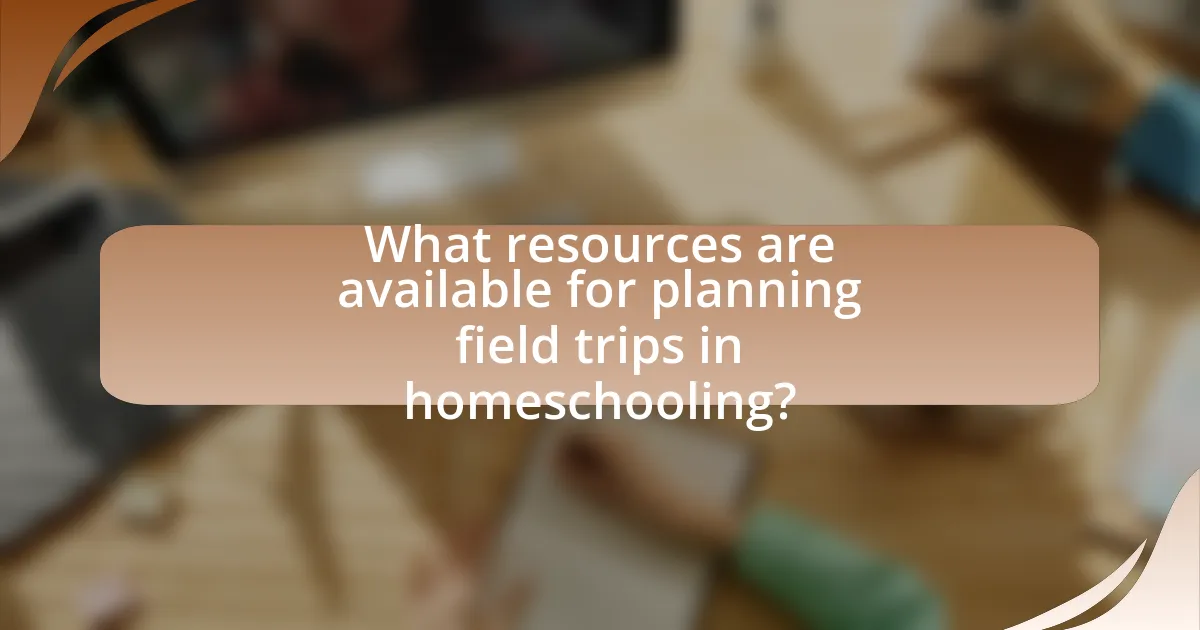
What resources are available for planning field trips in homeschooling?
Various resources are available for planning field trips in homeschooling, including online databases, local educational organizations, and community resources. Websites like Field Trip Directory and Homeschool Field Trips provide comprehensive listings of educational venues and activities tailored for homeschoolers. Additionally, local museums, science centers, and historical sites often offer special programs and discounts for homeschooling families, enhancing the educational experience. Furthermore, homeschooling networks and co-ops frequently share field trip ideas and organize group outings, fostering social interaction and collaborative learning among students.
How can online platforms assist in finding field trip opportunities?
Online platforms can assist in finding field trip opportunities by providing centralized databases and search functionalities that connect educators and families with relevant venues and activities. These platforms often feature user-generated reviews, detailed descriptions, and logistical information about various field trip options, making it easier for homeschoolers to identify suitable experiences. For instance, websites like Field Trip Directory and Homeschool Field Trips offer curated lists of educational destinations, categorized by subject matter and location, which enhances accessibility and planning efficiency for homeschooling families.
What are some recommended websites for homeschooling field trips?
Recommended websites for homeschooling field trips include Field Trip Directory, which offers a comprehensive list of educational destinations across the United States, and Homeschool Field Trips, a resource that provides information on local attractions and events tailored for homeschoolers. Additionally, the National Park Service website features educational programs and resources for field trips to national parks, enhancing the learning experience through nature. These websites are valuable for finding engaging and educational opportunities that align with homeschooling curricula.
How can local organizations support field trip planning?
Local organizations can support field trip planning by providing resources, expertise, and logistical assistance. They can offer educational materials, access to local attractions, and connections to professionals who can enhance the learning experience. For instance, organizations like museums or nature centers often have programs specifically designed for educational groups, which can include guided tours and hands-on activities tailored to curriculum standards. Additionally, local organizations may collaborate with homeschooling groups to create customized field trip itineraries that align with educational goals, ensuring that the trips are both informative and engaging.
What are some creative ideas for field trips that enhance learning?
Creative ideas for field trips that enhance learning include visits to science centers, historical sites, art museums, and local farms. Science centers provide hands-on experiments that reinforce scientific concepts, while historical sites offer immersive experiences that bring history to life, allowing students to connect with the past. Art museums encourage creativity and critical thinking through exposure to various art forms and styles. Local farms teach students about agriculture, sustainability, and the food supply chain, fostering an understanding of environmental science. Each of these field trip ideas aligns with educational standards and enhances learning by providing real-world applications of classroom knowledge.
How can virtual field trips be incorporated into homeschooling?
Virtual field trips can be incorporated into homeschooling by integrating online resources that provide immersive educational experiences. Parents can utilize platforms such as Google Arts & Culture, which offers virtual tours of museums and historical sites, allowing students to explore diverse subjects from art to science. Additionally, educators can schedule live virtual tours with experts, enhancing engagement and providing real-time interaction. Research indicates that virtual field trips can improve student motivation and learning outcomes, as they offer unique opportunities for experiential learning that traditional textbooks cannot provide.
What unique local resources can be utilized for field trips?
Unique local resources for field trips include museums, nature reserves, historical sites, and community farms. Museums often provide interactive exhibits and educational programs tailored for students, enhancing learning through hands-on experiences. Nature reserves offer opportunities for outdoor education, allowing students to study ecosystems and wildlife in their natural habitats. Historical sites provide context for local history, enabling students to engage with their community’s past. Community farms can teach students about agriculture, sustainability, and food production, fostering a connection to local resources and environmental stewardship. These resources not only enrich the educational experience but also promote community engagement and real-world learning.
What tips can help parents maximize the benefits of field trips in homeschooling?
To maximize the benefits of field trips in homeschooling, parents should plan trips that align with their curriculum and learning objectives. This targeted approach ensures that the experiences are relevant and reinforce the concepts being taught at home. For instance, visiting a science museum can enhance understanding of biology or physics topics covered in lessons. Additionally, parents should encourage active participation by asking open-ended questions during the trip, which fosters critical thinking and engagement. Research indicates that experiential learning, such as field trips, can improve retention of information by up to 75%, compared to traditional learning methods. Finally, parents should follow up with discussions or projects related to the trip, solidifying the knowledge gained and making connections to broader themes in their studies.






